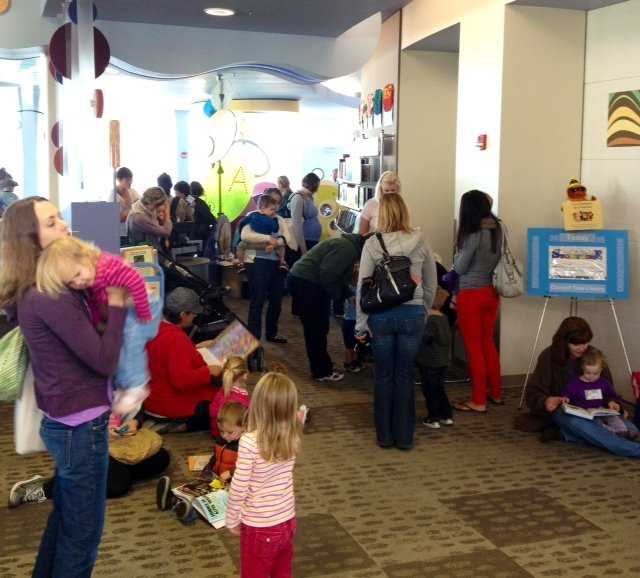Updated 4/2019
Attending storytime is practically a right-of-passage for young children in our community. And, Poudre River Public Library District is widely-known for the high-quality storytimes available at each of our three libraries as well as locations throughout the community. Library storytimes are presented by experienced professionals and designed to promote early language and reading experiences that support school readiness.
Each library storytime draws on professional literacy research, learning theory, and Every Child Ready to Read® best practices. Specific themes, books, songs, and activities are chosen in order to create rich learning experiences that are developmentally appropriate and entertaining and can be duplicated outside of the library setting.
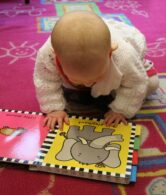 “Learning to read begins at birth with quality language experiences and access to books,” advises Vicky Hays, Early Literacy Librarian at Poudre River Libraries. “Library storytime plays an important role in helping children develop their foundation for reading and in supporting parents and caregivers in valuable at-home literacy experiences.”
“Learning to read begins at birth with quality language experiences and access to books,” advises Vicky Hays, Early Literacy Librarian at Poudre River Libraries. “Library storytime plays an important role in helping children develop their foundation for reading and in supporting parents and caregivers in valuable at-home literacy experiences.”
Whether you’re attending a baby, toddler, or preschool-aged storytime, the program will always include fun, interactive experiences in five areas: talking, singing, reading, writing, and playing. Parents and caregivers will also come away with additional resources to expand their child’s language skills and to replicate or create similar activities at home.
Research shows that when each of the five core literacy activities is practiced regularly – and often, – emerging readers develop a more solid foundation for reading on their own.
Here are just a few examples of how library storytime leaders integrate these reading building blocks throughout the storytime.
Talking
Talking with children teaches them the richness of language and helps them learn new vocabulary words and information. By listening to conversations around them, children learn to understand and use language and how to express themselves.
During library storytime, talking with children is often connected to playful games, activities, or fingerplays like “Itsy, Bitsy, Spider” or “Dance Your Fingers Up.”
Dance your Fingers Up
Dance your fingers up,
Dance your fingers down.
Dance your fingers to the side,
Dance them all around!
Dance them on your shoulders,
Dance them on your head.
Dance them on your tummy,
And put them all to bed!
Singing
You don’t need to sound like Adele or Pavarotti to sing with children and help them learn about words, rhymes, and sounds and syllables. Not only is singing a fun bonding experience, it allows children to hear words slowed down so they can distinguish all their parts.
Do Your Ears Hang Low?
Do your ears hang low?
Do they wobble to and fro?
Can you tie them in a knot?
Can you tie them in a bow?
Can you throw them over your shoulder
like a regimental soldier?
Do your ears hang low? …
Reading
Reading aloud to children is perhaps the single most important way to help them prepare to read. Not only does is help emerging readers connects words with language and stories, it also motivates them to become readers themselves, especially when they “catch” you reading. High quality storybooks help to develop a child’s critical thinking skills and can instill a lifelong love of reading.
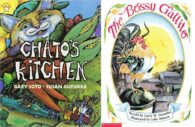 Library storytimes include as many as six books at every gathering, many which include culturally-diverse characters, settings, themes, and stories.
Library storytimes include as many as six books at every gathering, many which include culturally-diverse characters, settings, themes, and stories.
For example, the Fiesta! storytime includes books like Chato’s Kitchen / Chato y Su Cena by Gary Soto and The Bossy Gallito / El Gallo de Bodas, a Cuban folktale retold by Lucia M. Gonzalez.
Writing
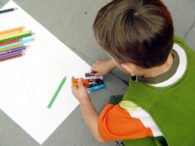 Emerging readers learn through scribbling and drawing, becoming aware that printed letters and words have meaning and communicate information. Because fine-motor skills and good dexterity are needed for forming printed letters, children are encouraged to draw and scribble, trace shapes, have fun with fingerplays, and move around.
Emerging readers learn through scribbling and drawing, becoming aware that printed letters and words have meaning and communicate information. Because fine-motor skills and good dexterity are needed for forming printed letters, children are encouraged to draw and scribble, trace shapes, have fun with fingerplays, and move around.
During the library storytime Cookie Crazy, preschoolers use crayons and color pencils to outline cookie cutters on construction paper, and then practice matching the cookie cutter with the outline shape.
Playing
Playing is one of the primary ways young children learn. Whether it’s peek-a-boo, wooden blocks, an “I Spy” game, or finger puppets, play teaches children how to think, imagine, and express themselves. In library storytime, play also encourages socialization, stimulates imagination, and builds fine motor skills.
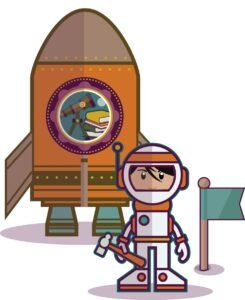 During the library’s Outer Space-themed toddler storytime, participants take part in astronaut exercises to stay “in top physical condition to endure the rigors of space travel.”
During the library’s Outer Space-themed toddler storytime, participants take part in astronaut exercises to stay “in top physical condition to endure the rigors of space travel.”
The astronaut “trainees” take part in an out-of-this-world workout:
- Solar System Stretch: Reach to the sky. Then stretch arms out wide.
- Rocket Ship Run-in-Place: Warm up and get ready to take off!
- Lunar Leaps: Jump as far as you can.
- Trainee Toe Touches: Touch your toes ten times.
- Planet Push-ups: Do eight push-ups. One for each planet!
- Constellation Cool Down: Lie down on your back. Relax as you imagine staring up at a starry sky.
“Our storytimes go far beyond just being an entertaining performance by the presenter,” explains Jennifer Zachman, Children’s Librarian. “Our storytime presenters take into account the quality of the experience and the materials used and present them in age-appropriate and innovative ways. Plus, we make sure that we’re partnering with parents and caregivers to support them as their child’s first and most important teacher.”
Cultural & Social Diversity
Poudre River Public Library District storytimes frequently use culturally-diverse texts and World Language Storytimes are presented in multiple languages including Arabic, Japanese, and American Sign Language. Many also include age-appropriate digital literacy elements as part of school readiness and learning.
If you’d like more information on in-library storytimes, Express storytimes and Rincon de Cuentos, or the various World Language storytimes, visit the Library District’s storytime webpage or contact the Answer Center at 970-221-6740.
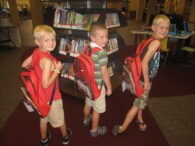 You can also enjoy storytime at home using the T.A.L.E.S. Kits. These Take Away Literacy Enrichment Skills kits are all sorts of learning fun for families with toddlers and small children.
You can also enjoy storytime at home using the T.A.L.E.S. Kits. These Take Away Literacy Enrichment Skills kits are all sorts of learning fun for families with toddlers and small children.
Each kit is designed to enhance young children’s early literacy development by providing parents and other caregivers with an assortment of books, songs, and activities to do with their child – similar to what you might experience at one of the many popular Library District story times.
Read more about T.A.L.E.S. Kit in a recent blog post.
Finally, mark your calendars for the 2019 Summer Reading Challenge: A Universe of Stories! Registration opens May 28 and is a perfect opportunity to practice these core literacy skills with your youngest readers. Adults, children, teens, and tweens are also invited to participate in summer reading adventures at the Library!

